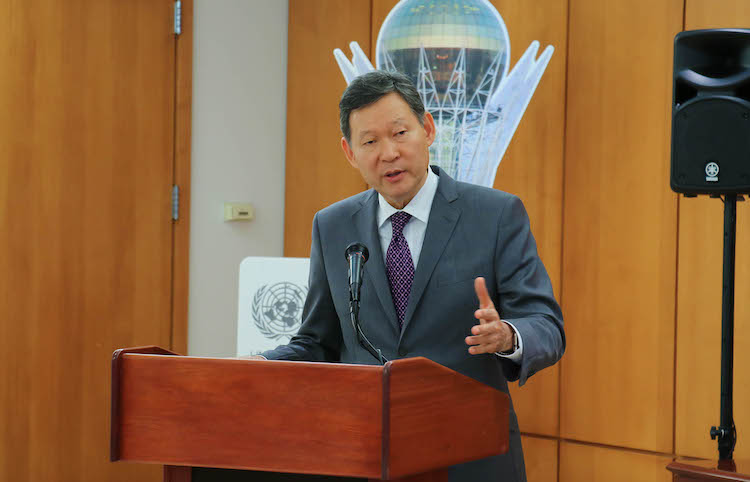By Joan Erakit
NEW YORK (IDN) – The implementation of Agenda 2030 for Sustainable Development is slowly building momentum around the United Nations and amongst member states who see its success as vital to their work.
During the High-Level Political Forum July 10-19, many are gathered at the Headquarters in New York to not only review action plans and offer recommendations but also to continue a dialogue on implementation.
Kazakhstan, a country keen to promote its growing economy and energy sector, is part of the United Nations Economic and Social Commission for Asia and the Pacific (ESACP) — a group of 53 member nations and 9 associate member states — one of the UN’s most comprehensive regional commissions.
It was only befitting therefore that the Kazakhstan Permanent Mission to the United Nations hosted ESCAP Executive Secretary and Under-Secretary-General of the UN, Dr. Shamshad Akhtar, for a briefing to discuss the progress of the commission on Agenda 2030.
“We consider it a privilege to have this . . . event together with ESCAP which has provided exceptional leadership on key economic and social concerns of relevance to the vast Asia and Pacific Region and in particular to the Central Asian region . . . a critical and important part of the world that can greatly promote peace, security and stability,” said Ambassador Kairat Umarov, Permanent Representative of Kazakhstan to the UN in New York, in his opening remarks.
Since gaining independence (in 1991), he said, Kazakhstan has worked closely with ESCAP on noteworthy milestone projects, the first one being the Green Bridge Partnership Programme, with some 50 countries joining to work towards the transition to a green economy.
That, he noted, was the precursor to all of the country’s energy initiatives, which then culminated in the landmark EXPO 2017. Kazakhstan also set up outreach programmes to LDCs (least developed countries) and PSIDS (Pacific Small Island Developing States) in the form of biogas projects.
Kazakhstan is proud to host ESCAP’s Sub-Regional Office for North and Central Asia (NCA), which serves as the sub-regional platform to build and strengthen multilateral partnerships and intergovernmental cooperation for inclusive and sustainable development and integration in North and Central Asia.
Ambassador Umarov reminded the audience that Kazakhstan is currently hosting, in Astana, the International Exposition on the theme of “Future Energy”, which opened on June 10 and will run through September 10. On the second day of EXPO 2017, on June 11, the Eighth International Forum on Energy for Sustainable Development opened with an Energy Ministerial in Astana that Kazakhstan organized with the support of the UN Regional Commissions, Programmes and Agencies, as well as other energy partners.
The special side event held in New York, also aimed to further promote ongoing dialogue and partnership of all stakeholders within ESCAP and the UN to implement tasks and goals of the global 2030 Agenda for Sustainable Development for which the Executive Secretary shared insights and made many recommendations for new forms of collaboration.

Under the guidance of Dr. Akhtar, ESCAP has launched a regional map for implementation of the 2030 Agenda that addresses context, geography and specific economic issues faced by countries in the region. In a sense, what ESCAP has managed to highlight is that there is no “one size fits all” approach to implementing the Sustainable Development Goals (SDGs). Member states, working together through these regional commissions, need to utilize creativity and innovation, working together to ensure their national action plans are not only implemented but are region specific.
The regional road map developed by ESCAP for implementing Agenda 2030 was agreed upon at the Fourth Asia-Pacific Forum on Sustainable Development via Resolution 73/9 and adopted at the ESCAP’s 73th Commission Session. The Road Map identifies key priority areas faced by the region and which affect the success of the implementation of Agenda 2030. These include energy, climate change, management of natural resources, disaster risk reduction, and resilience, and of course, leaving no one behind.
Dr. Akhtar was passionate in expressing the urgency to address the needs of the Asia-Pacific region with regards to the SDGs, suggesting that by promoting and actively working towards sustainable development in the region would not only create inclusive and peaceful societies, but would also birth a stability that would become the basis of a strong economy.
What was made clear during the meeting at the Kazakhstan Mission to the UN was that regional cooperation is not to be taken lightly; regional cooperation is the key ingredient to allowing countries to work on their national action plans in such a way that sees to the success of Agenda 2030.
The beauty of regional cooperation is the wealth of information sharing that happens when member states come together.
Following the “no one size fits all” approach, a collaboration to produce unique strategies to tackling challenges like energy security, climate change and inclusion are reached organically with a sense of shared responsibility. It no longer becomes the country taking a list of objectives passed down to them by UN officials and instead becomes an ambitious set of national action plans devised through peer-to-peer learning, for the benefit of its citizens.
“Regional action is critical to strengthen the link between global commitments and national efforts. ESCAP, thanks to its unique role, niche and mandate, plays a strong connecting bridging role,” Umarov added.
ESACP continues to play this role by facilitating cooperation among members and associate members. In a sense, ESCAP provides the opportunities for members to mobilize, consult and support each other in achieving Agenda 2030 by contextualizing global commitments and national priorities in a harmonic way – one that aligns with the overall conditions and needs of the region. [IDN-InDepthNews – 14 July 2016]
Photos: Ambassador Kairat Umarov, Permanent Representative of Kazakhstan to the UN in New York (top); ESCAP Executive Secretary and Under-Secretary-General of the UN, Dr. Shamshad Akhtar addressing audience (middle). Credit: Kazakh Permanent Mission to the UN.
IDN is the flagship of International Press Syndicate.
facebook.com/IDN.GoingDeeper – twitter.com/InDepthNews

